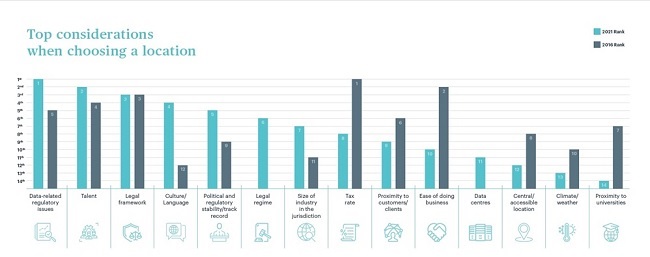In global research conducted by William Fry, C-suite executives have informed us about the key factors driving their digital strategies to transform their businesses. Digital culture, choosing a location that unlocks digital transformation, data related regulatory issues and utilising new technologies, are among the key drivers identified as influencing the decision making process.
Let's explore the findings of our and others research on this topic.
The Importance of Digital Culture
Critical to the success of teams in driving digital and data strategies in an organisation, is the presence of a digital or data-driven culture. Digital or data-driven culture stimulates the use of technology and data to gain valuable insights and understand customer behaviour. It allows organisations to provide customized products and services and achieve improved efficiency in customer experience (CX).
Our "Europe for Big Data" report confirmed that companies across all industries and sectors are data driven companies. Our research identified that these companies are increasingly relying on data to identify and implement commercial opportunities and generate competitive advantage in their digital transformation strategies. This widespread intention to engage in more strategic use of data is evidenced by the fact that in our "Global Trends in Technology & Data" report, 64% of executives from organisations agreed strongly that they will use data and IT systems to future-proof their businesses against future pandemics.
In our "Global Trends in Technology & Data" report, we found that there is widespread agreement among global C-suite decision makers regarding the need for future proofing through data and IT (93%), investment in flexible working capabilities (92%) and better use of big data capabilities (87%). The highest level of agreement regarding changes to future strategy was for investment in digital channels/transformation, with 93% agreeing that this was core to facilitating digital and data cultures and future strategy.
Key Drivers identified as important for locating in Ireland or Europe for Digital Transformation
Our research showed that the most important drivers for international firms making strategic decisions in relation to the locating their businesses within the European Union (EU) are:
- the data-related regulatory regime;
- access to talent;
- the legal framework of the jurisdiction;
- language and culture;
- political stability; and
- regulatory track record.
It is not surprising that data-related regulatory issues (including ease of doing business in the EU, and appropriate data regulation) have become the top driver for location decisions as evidenced by our latest report, "Global Trends in Technology & Data". These top drivers have replaced those in 2016, being tax rate (moving from number 1 to number 8); the ease of doing business (moving from 2 to 10); and the importance of a jurisdiction's legal framework (remaining at number 3). Our findings showed that companies headquartered in the US are significantly more likely than European firms to attach high importance to the legal framework in making such decisions.
In addition to these changes in importance, access to talent (which along with technology and tax remain key factors for companies choosing Ireland as an EU location) continues to rank highly. Our report highlighted that talent has attained increased importance as a consideration for investment and expansion (rising from number 4 to number 2). Despite its decrease in ranking, from number 1 to number 8, tax remains a critical factor for decision making at board level for investment and digital transformation.
Interestingly, culture/language rose significantly in the rankings, up from 12th to 4th since 2016. European and US headquartered firms place a considerably higher emphasis on language than their Asian counterparts.
Key Data Related Considerations and Influences on Investment in
Digital Strategies
What are the key data related factors that should be considered
when looking to Ireland as a hub for digital transformation?
In our latest report "Global Trends in Technology & Data", Ireland was rated as good or excellent for data related regulation by 92% of participants; Ireland's legal regime received good or excellent ratings from 97%; and the ratings for language and culture (93%) and political and regulatory stability (90%) scored very highly. Ireland's score as an excellent data-related investment destination has increased significantly, from 45% to 59%. An impressive 97% of respondents deemed Ireland 'fair to excellent', placing the jurisdiction second (jointly with the Netherlands) in Europe in this regard, with Germany number one.
Investment in technologies was a key trend in our original "Europe for Big Data" report, which identified that from enterprise resource planning systems, mobile and e-commerce capabilities or digital marketing to systems driven by artificial intelligence (AI) and machine learning, businesses cannot expect to be, or to remain, competitive without investment in technology that enables data analytics. Even though globally and in the EU, there has been significant disruption, it is very promising for Ireland's future inward investment community that 93% of companies were considering new data related investments in Ireland in the years 2021 to 2022. (from our "Global Trends in Technology & Data" report).
This indicates that businesses are considering Ireland as a potential hub for enabling their digital transformation strategies and technology related investments, based on the considerations and key factors outlined above driving their business and strategic decisions.
Regional Hubs for Regional Strategy
Due to differing data regulation regimes across regions, many international organisations are deciding that their data decision making function, operations and strategies for each geographic region must be located within that same region. This has been a consistent factor since our first report "Europe for Big Data". What has changed though is the increased importance of data-related regulatory issues in coming to that decision. Data-related regulatory issues are ranked as the number one issue when considering an EU location by organisations.
Data as the Leading Driver
In our latest report "Global Trends in Technology & Data", when asked to name critical considerations for a European location, 14% of participant organisations put data-related regulatory issues on top. To put this in context, just 5% put the tax rate on top. The GDPR has had a positive impact on EU-based investments with 85% of respondents (up from 81% in 2016) noting that concern over the GDPR and related privacy issues was a key driver for having discrete data operations in the EU. Our research and analysis highlights that the considerations and core issues that drive digital investment decisions are manifold and varied. They range from cultural and political factors to legal and regulatory, but retain at their core, talent, tax and technology considerations. Such decisions are increasingly being made at board room level. It is essential that C-Suite Executives possess the requisite understanding of technology, digital culture and the impact on the location of such investments. They must be able to consider the advantages and disadvantages of each and analyse the impact that these key drivers may have on their business and digital transformation strategies.
The content of this article is intended to provide a general guide to the subject matter. Specialist advice should be sought about your specific circumstances.


